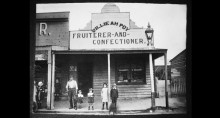Watch the video of Vivienne Poy’s book event here.
MAPS student David Tobiasz interviewed The Honourable Dr. Vivienne Poy on her latest book in preparation for her presentation at the Asian Institute at the Munk School of Global Affairs on November 27.
When and how did you decide to write Heroes and Gamblers?
Approximately 11 years ago, my husband Neville and I participated in a large Poy clan gathering in Albury, NSW, Australia. We got to know different generations of the Poys, and I was moved by the closeness of the family. The cousins were very interested in their Chinese roots, even though, visually, most of them don’t look Asian at all. They wanted so much to find out more about Willie Ah Poy, their father/grandfather/great grandfather. They were asking me questions that I couldn’t answer, so that aroused my curiosity. As a historian, I knew I could help them. That was how I started my research on the family.
You’ve published several books that deal with family histories: Building Bridges and A River Named Lee, to name just two. What draws you to the subject? What was different about writing Heroes and Gamblers?
I love history, and have always believed the best way to learn history is through the lives and experiences of individuals. The books I wrote about my own family took place mainly in Asia. Heroes & Gamblers is a study of Chinese diaspora.
UBC scholar Henry Yu has written about the idea of a “Pacific Canada” in which the Canadian identity is re-imagined to acknowledge not just our Asia-Pacific future, but our Asia-Pacific past. As Heroes and Gamblers chronicles one extended family’s journey through that past and into the present, what are your thoughts on the Asia-Pacific’s standing in our national discourse? On a similar note, what can Canadians learn from reading Heroes and Gamblers?
Canada and Canadians need to be more aware of our nation builders who came over the Pacific. These nation builders should be studied in school curriculums, and be recognized equally as the immigrants who came over the Atlantic.
From reading Heroes & Gamblers, Canadians can learn that human migration is nothing new, and we should be more accepting of newcomers to this country. Besides the First Nations Peoples, those who have been in Canada for generations are but descendants of immigrants past.
A recurring trope in Heroes and Gamblers is transnational identity – that life in new places and cultures changes people and indeed whole families. How do you experience this in your own, very much, international life?
I am a Canadian with a transnational identity. I can fit in in different parts of the world, and that makes me much more welcoming to differences in others.
Of the many remarkable people in Heroes and Gamblers, Willie Ah Poy – who the title aptly describes – truly stands out. What sort of connection do you feel to Willie Ah Poy in particular, and, more generally, to that distant generation of relatives who populate the book?
Willie Ah Poy was the reason for this book. My paternal ancestors also came from the Siyi district of south China. I lived in China as a child and having a Chinese upbringing, I fully understand Willie and the distant generations of relatives in the book.
Were some parts of Heroes and Gamblers more difficult to write than others? Which gave you particular joy? What were the most surprising discoveries you made while researching the book?
There was no part of the book that was more difficult to write, but I did wish I had more information on different family members in the past. Having access to original documents always make me happy. I was most surprised to find out how the Canadian Poys entered Canada during the period of Chinese exclusion.
